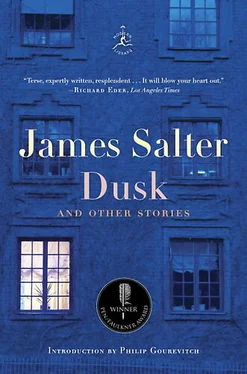“No, what about them?”
“They’ll give thee cancer.”
“Thee?”
“It’s what the Quakers say.”
“Are you really a Quaker?”
“Oh, back a ways.”
He had her by the elbow. “Do you know what I’d like? I’d like to fuck thee,” he said.
She bent her arm to remove it.
“I mean it,” he said. “Tonight.”
“Some other time,” she told him.
“I don’t have another time. My wife’s coming tomorrow, I only have tonight.”
“That’s too bad. I have every night.”
She hadn’t forgotten him, though she’d forgotten his name. His shirt had elegant blue stripes. “Oh, damn you,” she suddenly cried. It was the horse. He hadn’t gone. He was over by the fence. She began to call him, “Here, boy. Come here,” she begged. He wouldn’t move.
She didn’t know what to do. Five minutes had passed, perhaps longer. Oh, God, she said, oh, Lord, oh God our Father. She could see the long stretch of road that came up from the highway, the unpaved surface very pale. Someone would come up that road and not turn off. The disastrous road. She had been driving it that day with her husband. There was something he had been meaning to tell her, Henry said, his head tilted back at a funny angle. He was making a change in his life. Her heart took a skip. He was breaking off with Mara, he said.
There was a silence.
Finally she said, “With who?”
He realized his mistake. “The girl who… in the architect’s office. She’s the draftsman.”
“What do you mean, breaking it off?” It was hard for her to speak. She was looking at him as one would look at a fugitive.
“You knew about that, didn’t you? I was sure you knew. Anyway it’s over. I wanted to tell you. I wanted to put it all behind us.”
“Stop the car,” she said. “Don’t say any more, stop here.”
He drove alongside her trying to explain but she was picking up the biggest stones she could find and throwing them at the car. Then she cut unsteadily across the fields, the sage bushes scratching her legs.
When she heard him drive up after midnight she jumped from bed and shouted from the window, “No, no! Go away!”
“What I never understood is why no one told me,” she used to say. “They were supposed to be my friends.”
Some failed, some divorced, some got shot in trailers like Doug Portis who had the excavation business and was seeing the policeman’s wife. Some like her husband moved to Santa Barbara and became the extra man at dinner parties.
It was growing dark. Help me, someone, help me, she kept repeating. Someone would come, they had to. She tried not to be afraid. She thought of her father who could explain life in one sentence, “They knock you down and you get up. That’s what it’s all about.” He recognized only one virtue. He would hear what had happened, that she merely lay there. She had to try to get home, even if she went only a little way, even a few yards.
Pushing with her palms she managed to drag herself, calling the horse as she did. Perhaps she could grab a stirrup if he came. She tried to find him. In the last of the light she saw the fading cottonwoods but the rest had disappeared. The fence posts were gone. The meadows had drifted away.
She tried to play a game, she wasn’t lying near the ditch, she was in another place, in all the places, on Eleventh Street in that first apartment above the big skylight of the restaurant, the morning in Sausalito with the maid knocking on the door and Henry trying to call in Spanish, not now, not now! And postcards on the marble of the dresser and things they’d bought. Outside the hotel in Haiti the cabdrivers were leaning on their cars and calling out in soft voices, Hey, blanc , you like to go to a nice beach? Ibo beach? They wanted thirty dollars for the day, they said, which meant the price was probably about five. Go ahead, give it to him, she said. She could be there so easily, or in her own bed reading on a stormy day with the rain gusting against the window and the dogs near her feet. On the desk were photographs: horses, and her jumping, and one of her father at lunch outside when he was thirty, at Burning Tree. She had called him one day—she was getting married, she said. Married, he said, to whom? A man named Henry Vare, she said, who is wearing a beautiful suit, she wanted to add, and has wonderful wide hands. Tomorrow, she said.
“Tomorrow?” He sounded farther away. “Are you sure you’re doing the right thing?”
“Absolutely.”
“God bless you,” he said.
That summer was the one they came here—it was where Henry had been living—and bought the place past the Macraes’. All year they fixed up the house and Henry started his landscaping business. They had their own world. Up through the fields in nothing but shorts, the earth warm under their feet, skin flecked with dirt from swimming in the ditch where the water was chilly and deep, like two sun-bleached children but far better, the screen door slamming, things on the kitchen table, catalogues, knives, new everything. Autumn with its brilliant blue skies and the first storms coming up from the west.
It was dark now, everywhere except up by the ridge. There were all the things she had meant to do, to go East again, to visit certain friends, to live a year by the sea. She could not believe it was over, that she was going to be left here on the ground.
Suddenly she started to call for help, wildly, the cords standing out in her neck. In the darkness the horse raised his head. She kept shouting. She already knew it was a thing she would pay for, she was loosing the demonic. At last she stopped. She could hear the pounding of her heart and beyond that something else. Oh, God, she began to beg. Lying there she heard the first solemn drumbeats, terrible and slow.
Whatever it was, however bad, I’m going to do it as my father would, she thought. Hurriedly she tried to imagine him and as she was doing it a length of something went through her, something iron. In one unbelievable instant she realized the power of it, where it would take her, what it meant.
Her face was wet and she was shivering. Now it was here. Now you must do it, she realized. She knew there was a God, she hoped it. She shut her eyes. When she opened them it had begun, so utterly unforeseen and with such speed. She saw something dark moving along the fence line. It was her pony, the one her father had given her long ago, her black pony going home, across the broad fields, across the grassland. Wait, wait for me!
She began to scream.
Lights were jerking up and down along the ditch. It was a pickup coming over the uneven ground, the man who was sometimes building the lone house and a high school girl named Fern who worked at the golf course. They had the windows up and, turning, their lights swept close to the horse but they didn’t see him. They saw him later, coming back in silence, the big handsome face in the darkness looking at them dumbly.
“He’s saddled,” Fern said in surprise.
He was standing calmly. That was how they found her. They put her in the back—she was limp, there was dirt in her ears—and drove into Glenwood at eighty miles an hour, not even stopping to call ahead.
That wasn’t the right thing, as someone said later. It would have been better if they had gone the other way, about three miles up the road to Bob Lamb’s. He was the vet but he might have done something. Whatever you said, he was the best doctor around.
They would have pulled in with the headlights blooming on the white farmhouse as happened so many nights. Everyone knew Bob Lamb. There were a hundred dogs, his own among them, buried in back of the barn.
It’s hard now to think of all the places and nights, Nicola’s like a railway car, deep and gleaming, the crowd at the Un, Deux, Trois , Billy’s. Unknown brilliant faces jammed at the bar. The dark, dramatic eye that blazes for a moment and disappears.
Читать дальше












